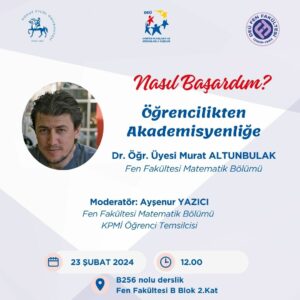M. R. Pournaki, Sharif University of Technology. Date: 15th of March, 2024, Friday, Time: 13.00 – 14.00. Place: Dokuz Eylül Univ., Tınaztepe Campus, Faculty of Science, Department of Mathematics, Classroom B255.
Abstract: The ring , having only one unit, cannot be generated by its units. It turns out, in the general theory of rings, that this is essentially the only example. In this talk, we give an elementary proof of “A finite commutative ring with nonzero identity is generated by its units if and only if it cannot have
as a quotient.” The proof uses graph theory and pointed out to the story of how unit graphs have been arisen. At the end, we discuss some of the recent developments in the theory.
